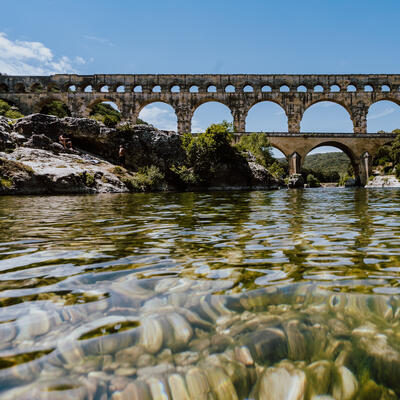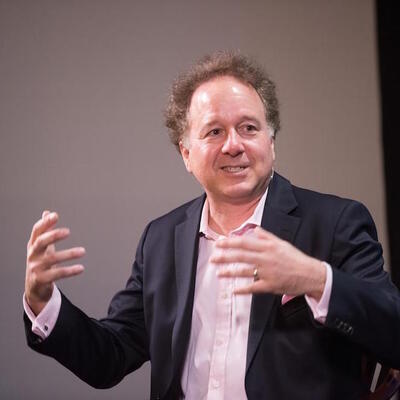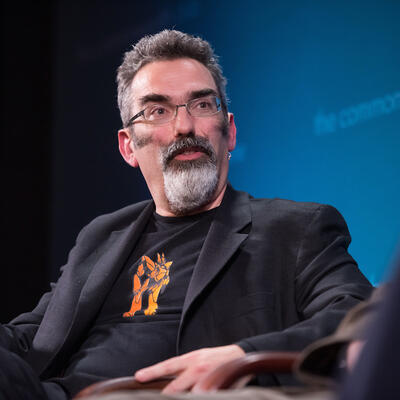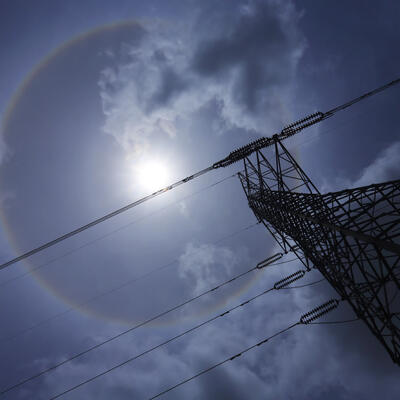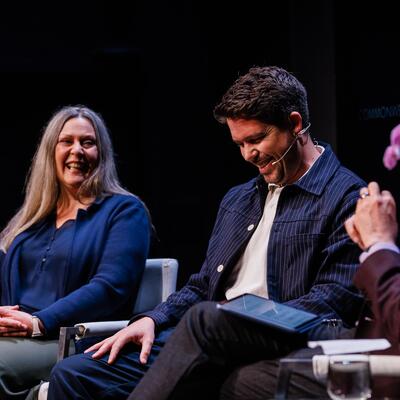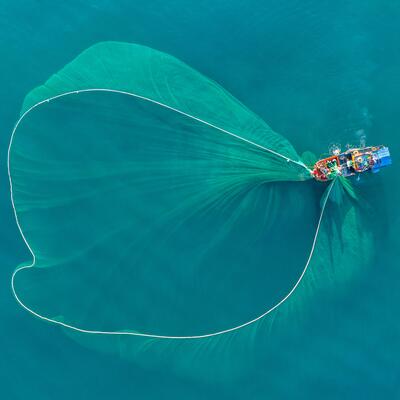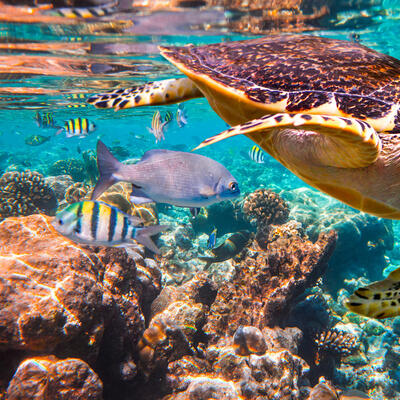
Sea Changes: Why Oceans Play a Bigger Role in Climate Change Than You Think
Guests

Sara Aminzadeh
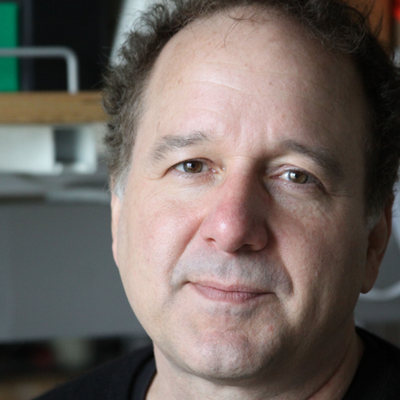
Ken Caldeira
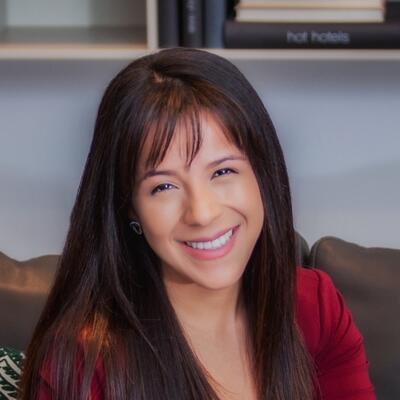
Daniela Fernandez
Summary
Global temperatures would be soaring even higher were it not for a powerful heat-trapping ally: oceans. From regulating the temperature of the planet to generating half of the oxygen we breathe, oceans are a vital part of sustaining life on Earth. Increasing their temperature as little as two degrees, however, has an opposite effect, threatening marine biodiversity and turbocharging dangerous hurricanes and typhoons. But there are bright prospects on the horizon for humans and oceans. Join us for a conversation exploring how oceans play a bigger role in climate than you may think.
Full Transcript
Announcer: This is Climate One, changing the conversation about energy, the economy, and the environment.
Daniela Fernandez: When you think about the ocean you don’t necessarily associate yourself with the ocean. But the reality is that the ocean affects and impacts all of us. (10’’)
Announcer: From regulating global temperatures to generating half the oxygen we breathe, healthy oceans are critical to sustaining life on Earth. But that vital role is under threat from human activity.
Ken Caldeira: We've been treating the oceans as a resource that we’re mining and we’re essentially just extracting things out of the ocean without thinking about sustainability. (9’’)
Announcer: So how do we get people invested in preserving healthy oceans?
Sara Aminzadeh: I think we do want more people to use the coast but in doing so we need to embrace a culture of care and stewardship. (7’’)
Announcer: Why oceans play a bigger role in climate than you think. Up next on Climate One.
Announcer: I’m Greg Dalton. Today’s program is underwritten by Bank of the West.
Announcer: From coast to coast and everywhere in between, the ocean plays a bigger role in our climate and our culture than we often realize.
Sara Aminzadeh: I think a lot of people across the country feel like going to the ocean and the coast is part of their culture and a part of their family and is a right.
Announcer: Sara Aminzadeh is Commissioner of the California Coastal Commission. Her agency’s mission is to make the ocean coast a place for everyone to enjoy, and to do so responsibly. Which can also encourage innovative solutions from the private sector.
Daniela Fernandez: We’re looking at all these entrepreneurs who know they want to help change the planet, they want to help the ocean.
Announcer: Daniela Fernandez is Founder and CEO of the Sustainable Ocean Alliance, a global organization that helps young entrepreneurs create start-ups that have a positive impact on oceans. And the oceans need all the help they can get right now.
Ken Caldeira: Almost all of the carbon dioxide that we emit through fossil fuel burning eventually winds up in the ocean.
Announcer: Ken Caldeira is a Climate Scientist with the Carnegie Institution for Science at Stanford. I began our conversation by asking him how our understanding of the connection between oceans and climate has changed over the last several decades.
Ken Caldeira: Yes, in the 1980s when I was a graduate student, it was considered a good thing that the oceans were absorbing both heat and carbon dioxide from the atmosphere because that was slowing climate change in the atmosphere and on land. And it was only several decades later that it really became understood that this heating of the ocean was damaging to marine life, coral reefs are the most obvious example. And then also the carbon dioxide when it's absorbed by the ocean acidifies the ocean and that's also harmful to marine life. And so what was once thought of as a service that the ocean was providing to humans is now seen as something damaging that humans are doing to the ocean.
Greg Dalton: And we’ll get into that a little more later. Daniela Fernandez, you say plastics are a gateway drug for understanding getting involved in the oceans. Tell us about that gateway drug, the straw.
Daniela Fernandez: They really are when you think about the ocean you don’t necessarily associate yourself with the ocean. And people don’t know that many people think that it’s trees in the forests that provide all the oxygen. But the reality is the ocean affects and impact all of us. Even if you're living in the middle of the United States, even if you’re living in a hut where you may never see the ocean. It truly is our life support. And so when I talk about plastic as being a gateway drug it means that it’s something so tangible that we can see, we can touch and that we use in every single day basis. The lifespan of a plastic bag is 12 minutes. And when you think about that it means that you use a plastic bag to go grocery shopping and the next thing you know it’s out in the garbage or in the landfill or it’s in the ocean. And so it’s really understanding the ocean problem and making it relatable to every person out there and not just making it seem as if it’s, you know, this distance and ecosystem that we don’t relate to. (0:08:15)
Greg Dalton: Sara Aminzadeh you think that plastics straws and bags are kind of a distraction that they get perhaps too much attention in the ocean conversation.
Sara Aminzadeh: I don’t know if I would say they get too much attention. But I guess I would say that I think a sole focus on plastics issues for example and a bag ban and a straw ban all of which I worked on in my previous life so it's critical but can feel like a total solution when the issues are much larger. And so I worry to some extent that celebrities or, you know, some aspects of our culture who want to engage in environmental issues feel that they've made a difference so to speak by focusing solely on a relatively small problem which is huge I care about these issues I worked on the California's plastic bag ban for eight years myself. But I want to be sure that in our culture where there are these short media bites and these short clips and everything is sort of immediate that people don't lose sight of the larger and more complex issues that we really have to grapple with about both climate change and the ocean.
Greg Dalton: And Ken Caldeira, you think that sort of a fetish on straws or bags can actually backfire in middle America by telling Nebraskans that they, you know, how they’re gonna drink their iced tea.
Ken Caldeira: Yes. I’m concerned obviously about turtles and others sea life that are swallowing plastics and getting damaged by these and that's a serious problem that we need to address. But I think we need to think about long-term political strategy and, you know, I’m worried about sort of the heart of Trump country in the middle of America taking away straws and plastic bags from people they going to say, look this is these coastal liberals taking things away from us. And so I think we need to be thoughtful both in environmental protection and also in political strategy.
Greg Dalton: We’re gonna turn to another area where there are some creative solutions being approached on the oceans. It’s hard to imagine that 50 years ago the town of Cancun didn't even exist beginning in 1970 the Mexican government and private investors work to turn the idyllic tropical beach into a tourism mecca. But among other environmental oversights the world-renowned coral reefs off the coast of Cancun weren’t given much thought or protection to try and slow the deterioration of the reefs. In 2010 a collection of sculptures was placed on the seafloor nearby. The idea of this underwater museum was to draw some of the 750,000 annual snorkelers and scuba divers away from the fragile reef systems. While the underwater museum is drawn about a quarter of those tourists away, it’s questionable whether it's actually helping the reefs. We spoke with Dr. Susana Enriquez, a researcher at Mexico's National Institute of Ocean Sciences and Limnology.
Susana Enriquez: Well the underwater museum was a nice, you know, alternative for visitors to having a nice day and dive in there. And it’s like going to an exhibition of nice sculptures in the bottom of the ocean. Has been great in terms of marketing but never a way to resolve the problem of the reef. Because one of the things you see when you look at this statue is that they are full of algae and this is a sign of fertilization, they shouldn’t be there. When we fertilize this habitat we favor the organic growth in the treatment of the mineral production. So we change the system, the system start to accumulate a lot of biomass organic carbon. And then the community also changes the opportunistic species are taking over the place in the northern part of the state in Cancun where the situation and the seagrass bed is terrible. And also you see already some effects in the coral community. In the ‘70s the place was a paradise it was beautiful, beautiful magnificent place. The amount of touristic offer is huge, it’s too high. And was not balanced with adequate control of sewage and all these products of the city and hotels and there’s no tertiary treatment for this. So there’s a huge fertilization of the ocean and the level of the environmental deterioration is serious. The economical pressure is huge the level of investment and of the interest, the economical interest here is huge. So it’s very difficult for any country also for Mexico to defend their natural environment from this pressure.
Greg Dalton: That was Susana Enriquez, an ocean science researcher at the National Autonomous University of Mexico. Daniela, let’s ask you because you work with a lot of entrepreneurs who are trying to develop profit motives to preserve ocean resources. There is trying to kind of Disneyfy an area to try to lure people away to a certain area of the oceans. Is it really a profit motive in conservation with some of the entrepreneurs you're dealing with?
Daniela Fernandez: You think it has to be profitable for it to be able to scale in the capitalistic system that we live in. If we have nonprofit it’s great, I mean I’ve run a nonprofit myself. But when you look at the ecosystem of change I mean you really have to make sure that you invest money in ocean tech entrepreneurs and then helping them nourish their idea. Just to give you some examples in the topics we’ve touched upon, one of our companies that we’ve invested in this past summer it’s called Loliware and they’re creating straws out of seaweed. So the idea here is to replace plastic completely. And the seaweed straw would biodegrade in water in 18 hours as opposed to lasting a lifetime. And that’s exactly the type of hope that we’re trying to promote in this really doom and gloom scenario that we live in. Another company it’s called Coral Vita and they’re changing the DNA cycle of corrals so they can be more resistant to warmer temperatures. So it’s truly about getting young people globally to feel that they have responsibility can take part in changing the ecosystem of the ocean and making it profitable is the way to go.
Greg Dalton: Straws from seaweed sounds interesting. But if that scales up, could there be a negative impact on the oceans with so much seaweed for straws, right there’s always kind of a shadow side to things, especially when they scale.
Daniela Fernandez: Yeah, I mean this company is using a sustainable seaweed farm in Norway. And seaweed is one of the algae that grows the fastest. So obviously there’s a concern there. But the phase two for this company is to go in the lab. So it’s truly about using new technology emerging tech and innovation to figure out how can we solve these problems so that we’re not harming the environment but rather we’re in harmony with our planet and being profitable but also in these really exciting solutions.
Greg Dalton: Ken Caldeira, your thoughts on kind of innovation technology to harness the profit motive to perhaps displace ocean harmful products or to leverage the ocean in different ways.
Ken Caldeira: I guess I’m always a believer in the portfolio of approaches. And I think that better technology is essential in that for example we can get better straws, better plastic bag replacements that are not deleterious to the oceans, that's good. But there's always this trade-off between somebody who can locally get some short-term gain and the damage that it created socialized and spread out over long times and many people. And we need a regulatory environment that prevents people from personalizing the benefits and socializing the damage.
Greg Dalton: So Daniela, when you look at companies do you look at because corporations are kind of externalizing machines, right. They consolidate profits and spread the costs widely sometimes. Are you looking at that when you invest in companies whether they are trying to push the impact somewhere else?
Daniela Fernandez: Oh absolutely. First of all it’s scalability, you know, this model scale can it grow outside of your local community where the company is from. Two, is impact, what positive impact are you having in the ocean space, right. We’re looking at all these entrepreneurs who know they want to help change the planet they want to help the ocean. This is the matter of understanding how their business model is so different than what the current system exist. And I personally believe that our current governance system is absolutely broken. And that’s where you have young people striking, you know, every Friday around the world because we believe that our generation is inheriting this problem that we didn’t caused and it’s time for us to stop pointing the finger at corporations, stop pointing the finger at government and to take responsibility for everything that’s happening in our ocean and in our environment. And this entrepreneurship passion it’s really a form of activating people and acting upon something that otherwise would just be a passive blame in the system that is continuously just incessantly thinking about the other person instead of, you know, really taking ownership for that problem yourself.
Greg Dalton: Sara, what are some of the most promising solutions that you see?
Sara Aminzadeh: Well, you know, I think in a couple of buckets I guess so to speak. I think about policy ideas and solutions. I think about investments and financial changes, and I think about private sector partnerships. I think there are lot of promising policy solutions. California is actually innovating one of the world's first ocean acidification action plans to look at ways to reduce the flow of pollution to the California coast which exacerbates hypoxic conditions and can improve the health of the ocean and make it more resilient to climate during changes. I think about investments as well. Investments in scientific monitoring and analysis investments in restoration. There's some preliminary evidence to suggest that planting seagrass can actually mitigate hypoxic conditions. And I think about private sector partnerships. For example, Hog Island Oyster Company based here in California is partnering with scientists who are measuring the impacts of ocean acidification and working to support aquaculture as a sustainable ocean industry that can hopefully thrive even in the face of climate change. So I think there are lot of sort of big ideas and big solutions it’s really about creating the critical mass and the political momentum behind them and about putting people in office ultimately who are gonna prioritize that. We've seen for example the guns lobby make it a voting issue, you know, something that they feel affects their culture and their lifestyle and their families. Well I think a lot of people in this room and across the country feel like going to the ocean and the coast is the part of their culture and a part of their family and is a right. And I would like to see a much more effective lobby effort where leaders and decision-makers the next president knows that they have to take action because it's something that their constituents are gonna hold them accountable for.
Announcer: You’re listening to a Climate One conversation about oceans and climate change Coming up, the evolving threats to the oceans’ -- and our own -- wellbeing.
Daniela Fernandez: When you look at the amount of microfibers that end up in the ocean because of the clothes that you are using, this becomes not only an ocean centric problem but it's a human health issue.h
Announcer: That’s up next, when Climate One continues.
Announcer: We’re talking about sustainable oceans at Climate One, with Sara Aminzadeh, Commissioner of the California Coastal Commission. Daniela Fernandez, Founder and CEO of the Sustainable Ocean Alliance. And Ken Caldeira, a Climate Scientist with the Carnegie Institution for Science at Stanford. I’m Greg Dalton. With so much of human life dependent on ocean life, I asked Ken Caldeira what can be done to counter the market incentives that lead to overfishing.
Ken Caldeira: Yes. I mean there are some positive examples of good fisheries management where you have an ability to exclude others and there’s a relatively small group of people and also marine exclusion zones are another approach. But these agreements are hard to develop but they’re essential.
Greg Dalton: And Sara your thoughts in terms of using markets, you’re changing markets getting some of the market incentives for extracting resources from the ocean.
Sara Aminzadeh: Yeah, I mean I think there are different levels to it as Ken alluded to. There’s obviously the major market changes that we need to see in terms of our energy whether we can move from fossil fuels to renewables. So that's perhaps one of the biggest market transformations that we need to see. And then of course there are market signals and transformations that we can incentivize in terms of how we’re treating our ocean with respect to pollution flows and overfishing and shipping and things of that nature. So I think large-scale market solutions can and need to be deployed to really address climate change impacts to the oceans and there are multiple ways that we can get at it, from personal use of sending a signal of whether or not to order that sushi in a restaurant. I was at the Monterey Bay Aquarium and I was reminded of their seafood watch program which is phenomenal. So the personal choices we make can send market signals. And then again I think putting leaders in place who are gonna pass policies that urge more immediate and transformative market solutions I think is important.
Greg Dalton: Ken Caldeira, a lot of the oceans are governed by outside national jurisdiction so they require multilateral so many, you know, U.N. kind of collaboration which is notoriously slow. There is some movement I guess on the maritime industry to kind of clean up the fuel they use to kind of be part aviation is another one these, global industry, this kind of out of the reach of particular countries because their assets are so mobile. Is there any hope there that those international institutions will move fast enough to solve climate?
Ken Caldeira: Well, I think they have to so let’s just hope they will I don’t know if it’s an expectation but obviously an international water things so very difficult even in national waters of countries that don't have much power it’s difficult for them to control their waters. We've been treating the oceans as a resource that we’re mining and we’re essentially just extracting things out of the ocean without thinking about sustainability and really, the mindset has to be that this is an endowment that we have to pass on to future generations and that we can live off the interest but we can’t eat into the capital. But how to actually do that in a policy framework is beyond my expertise
Greg Dalton: Let’s talk about offshore oil drilling, Sarah, in terms of, you know, most people are against that's really on the West Coast are against it even some people on the Atlantic Coast, you know, we’re in a situation now where they’re trying to open that up. What are the risks there in terms of offshore oil drilling new production can happen, forget the Arctic, the Continental U.S.
Sara Aminzadeh: Yeah, well the risk are enormous. We’ve seen that here in California both in San Francisco and Santa Barbara of an oil spill. And more fundamentally I think the risks of perpetuating fossil fuel driven economy, when we have renewable options is perilous, you know, California has been a leader on renewable energy and climate mitigation solutions. And so to even consider or accept opening up our offshore to oil drilling is preposterous, and I think you saw that reaction not only here in California but across the country when the Trump administration sent signals that they would be considering that. You saw typically red states step up and say not our coast unacceptable absolutely not. You saw California do that as well both the Coastal Commission and slew of businesses and organizations. So I think you know, there’s the immediate implications of the potential for a spill from offshore drilling, but more fundamentally sending a signal to oil companies that they can continue that line of business and this time is truly ludicrous.
Greg Dalton: Ken Caldeira.
Ken Caldeira: Almost all of the carbon dioxide that we emit through fossil fuel burning eventually winds up in the ocean. And so all of that carbon coming out of oil or the vast majority of it will end up in the ocean. And so if we want to protect the oceans, we can't be expanding our fossil fuel industries.
Greg Dalton: If you’re just joining us we’re talking about oceans at Climate One. I'm Greg Dalton. My guests are Sara Aminzadeh is Commissioner of the California Coastal Commission. Ken Caldeira is a climate scientist with the Department of Global Ecology at the Carnegie Institution for Science. And Daniela Fernandez is founder and CEO of the Sustainable Ocean Alliance. Daniela, another thing that ends up in these ocean are the fibers from synthetic clothing, which I learned recently that when you wash synthetic clothing you put it in the dryer there are some things that are gonna end up in the oceans. I wonder whether any of your portfolio companies are looking at replacing microbeads or other types of clothing that doesn't kind of trickle into the ocean.
Daniela Fernandez: Yeah I think there’s a really critical movement around sustainable fashion and millenials particularly are really interested in the renting phenomenon, right. Instead of just buying all your clothes why don’t you rent them, you know, I think Rent the Runway has a great model there’s others around there. And when you look at the amount of microfibers that end up in the ocean because of the clothes that you are using and everyone here is responsible for it. I mean we all wash our clothes they all end up in the ocean. And the ironic thing is that not only do these fibers end up in the ocean, but you're also ingesting them yourselves as you’re eating fish, right. So this becomes not only an ocean centric problem but it's a human health issue that we have to be concerned about. So when we’re thinking about, you know, these systematic changes, we have to approach them with innovation like why can’t we create a washing machine that captures all this microfiber, it’s already a filter with in, right. It doesn’t exist yet but, you know, for us putting this challenge out to our young community and saying, who out there has an idea to build this new laundry machine. Then finding the right industry partners to help them build out this machine and helping it scale. I think that’s the type of mentally we have to start getting into because previous business models have been set up in a way where we don't care about the repercussions of what happens to the end product, right. And if we, as human beings and no matter what role you have in your life, if you’re a consumer you pay with every dollar you spend, right. Whether you’re spending it in a sustainable product or if you’re, you know, eating less meat, right. You’re making a choice for the environment. If you are an investor the money that you are putting into a portfolio matters and it matters where it goes whether you’re choosing those stock options that ultimately end up supporting this fossil fuel companies or if you helping, you know, this new type of entrepreneurial activities. So it’s truly about understanding where our values lie and taking true responsibility to make our choices as consumers as investors as CEOs and leaders. I mean I’m really proud that Bank of the West is sponsoring this event, and they’re one of the only corporation that aren’t saying by 2030 we are going to do X, Y and Z as many of them are. We don’t have by 2030, we have the next 12 years to act on climate. David Attenborough and the series Our Planet that just came out on Netflix said the next 10 years will determined the fate of our planet. I mean just let that sit with you for a second. And the next 10 years will determine what will happen to our oceans to our forest to every human being and every life on earth. So it’s a matter of acting with urgency in every type of industry not just as entrepreneurs but as consumers.
Greg Dalton: Ken Caldeira.
Ken Caldeira: There’s a postdoc in my group who went to a local supermarket and bought some mussels and basically dissolve them in a strong base and there is a bunch of plastics that floated out of them. And so plastics are definitely in the food chain and, you know, I agree that improved technology is part of the answer. But one of the things if we think of, you know, we put lead in gasoline or, you know, people put lead in gasoline they didn’t know what it did in the environment it turned out to damage children's brains. We burn fossil fuels without knowing what CO2 would do to our environment and now we’re putting all these plastics into the environment and we don't really know it’s eating mussels with plastic and is that harmful to us or is that okay to do. But we’re transforming our planet in substantial ways without having any understanding of what the long-term consequences will be.
Greg Dalton: It seems like we’re playing this game of whack-a-mole. There’s phthalates and parabens and microbeads and it’s like they’re kind of which and those are successful stories of things that have been banned pretty quickly. I mean 2015, Obama signed a law about microbeads they banned it 2018. But, Sara, are we really just kind of playing whack-a-mole it's like every time we think we solved one toxic issue there’s a couple more that pop-up.
Sara Aminzadeh: I don’t know that I would characterize it as whack-a-mole. I think we’re constantly learning about new contaminants of emerging concern. The most recent of which is microfibers they have developed filters that you could put in washing machines to prevent those from going into the environment. I think the way I would characterize it is we have to be constantly vigilant. On the one hand we’re innovating new technologies at a pace which was previously unimaginable and on the other hand, we have to keep pace with our environmental and public health protection innovation so that those technologies can continue to monitor and understand and then protect us from any risks and harms that arise. Because we’re constantly seeing new things that come up and I think we need to embrace that as our society is rapidly evolving, so must our environmental and public health protections.
Greg Dalton: If you’re just joining us we’re talking about ocean health and climate at Climate One. I'm Greg Dalton. My guests are Sara Aminzadeh, Commissioner of the California Coastal Commission. Ken Caldeira, a Climate Scientist at Stanford and Daniela Fernandez, Founder and CEO of the Sustainable Ocean Alliance. We’re gonna do a lightning round. True or false for our guests. Starting with Sara. True or false. You frown on the notion that technology can save the oceans?
Sara Aminzadeh: I can only say true or false? False.
Greg Dalton: Ken Caldeira. The United States should conduct carefully controlled experiments of enhanced alkalinization, a process that could reverse ocean acidification.
Ken Caldeira: Yes.
Greg Dalton: Also Ken Caldeira. The United States should test other kinds of geo-engineering as a hedge against runaway climate destabilization.
Ken Caldeira: I have to answer that question?
Sara Aminzadeh: Ken’s questions are so much harder.
Ken Caldeira: Yeah, really. At small-scale. That wasn’t a yes or no but I don’t want to get --
Greg Dalton: Fine. Daniela Fernandez. True or false, manufacturing a paper bag requires about four times as much water as a plastic bag?
Daniela Fernandez: False.
Greg Dalton: Also Daniela. Fertilizers and other chemicals used in tree farming and paper manufacturing can cause acid rain and harm waterways?
Daniela Fernandez: Perhaps.
Greg Dalton: Association. I’m gonna mention something and our guests will say the first thing that pops into their mind unfiltered with complete abandon.
Ken Caldeira: I’m putting my filters on.
Sara Aminzadeh: I just want to note too that my fellow guests not followed the true false rules, so now I feel equally empowered to --
Greg Dalton: There you go. The wheels are coming off for this whole thing. Okay. Ken Caldeira, what comes to your mind when I say efforts to create giant vacuums to suck plastic pollution out of the ocean?
Ken Caldeira: Crazy.
Greg Dalton: Daniela Fernandez, U.S. Navy sonar.
Daniela Fernandez: Technology.
Greg Dalton: Sara Aminzadeh, the idea that cows should be fed seaweed to reduce their methane emissions.
Sara Aminzadeh: Distracting.
Greg Dalton: Daniela Fernandez. The Clean Water Act.
Daniela Fernandez: Important.
Greg Dalton: Ken Caldeira. Your favorite ocean movie.
Ken Caldeira: I pass. I don’t know what’s my favorite ocean movie.
Greg Dalton: How can an ocean guy not have a favorite ocean movie? Sara Aminzadeh. The worst ocean film ever.
Sara Aminzadeh: Can I do my favorite?
Ken Caldeira: Because I didn’t do my favorite maybe I can do the worst one.
Sara Aminzadeh: Okay, I’ll do my favorite. The Little Mermaid.
Greg Dalton: Ken Caldeira your worst?
Ken Caldeira: I don’t know, can I say the Day After Tomorrow? That’s not really an ocean movie but it’s still one of the worst.
Greg Dalton: We heard a lot of Waterworld out in the audience.
Ken Caldeira: I can say Waterworld didn’t seem too awkward.
Greg Dalton: Last one. Daniela, your favorite ocean heroine? Your favorite ocean character.
Daniela Fernandez: Character. Penguin.
Greg Dalton: There you go. Let’s give them a round of applause. Yeah, where’s Ariel? No love for Ariel.
Announcer: You're listening to a conversation about sustainability and the seas. This is Climate One. Coming up, some bright spots on the ocean’s horizon.
Sara Aminzadeh: I think that if we can find ways to sustainably use the ocean and have industries and communities that are invested in the health of the ocean then we will be more motivated to protect it.
Announcer: That’s up next, when Climate One continues.
Announcer: You’re listening to Climate One. We’re talking about the ocean and climate change with Sara Aminzadeh, Commissioner of the California Coastal Commission. Ken Caldeira, a Climate Scientist with the Department of Global Ecology with the Carnegie Institution for Science at Stanford. And Daniela Fernandez, Founder and CEO of the Sustainable Ocean Alliance. I’m Greg Dalton. Sea level rise is obviously one of the greatest risks when it comes to life near the ocean. But it’s also an opportunity for innovation, as Daniela Fernandez explains.
Daniela Fernandez: There’s actually a big area for data collection in the ocean. We’ve collected more data in the last two years in the history of the ocean space which when you think about that, you know, we know more about space than we know about what's going on in the ocean. So there’s definitely a lot of opportunity for exploration and understanding the deep sea or floor not for mining purposes but for rather just understanding the creatures that exist and are living there. There’s also opportunity to better understand the people that are experiencing these problems firsthand. There's, you know, when I find myself at Davos or sitting with a lot of these heads of state or high-level individuals, I ask myself and I ask them like are you listening to the people that are experiencing these problems on the ground. And that’s something that for us at our organization we do with our young leaders. We don’t come to them and say to them this is the silver bullet to solve all the ocean problems now go and do it, go sign this petition. But rather we say to them, what are your passions what are your interests, you know, how can we support you and your ideas and tell us what’s happening in your local community. Because we stopped listening and if we are trying to tackle these problems with models being put together in a data center instead of getting data from the people on the ground that are in developing communities that are experiencing sea level rise, are experiencing these horrible storms more so than we are. I mean we are so privileged to see all the news and see all the CNN pop up alerts and then to just, you know, feel a little bit of sadness and pity and then go on with our lives. It’s just not fair. So I think it’s honestly a matter of understanding what's going on in your local communities and listening to the people that are being affected by these problems.
Sara Aminzadeh: Can I say one thing on innovation such as sea level rise. The most innovative thing we can do to address sea level rise is nature-based solutions is to restore our coastal habitat. We lost 90% of our wetlands here in California and wetlands can be some of the most effective buffers to sea level rise and much more effective than coastal armoring. Similarly in Florida are mangroves really protect those areas. So I would just say if we’re thinking about innovation to address sea level rise, and this is where I don't go down the technology road. I sort of return to nature and how can our ecosystems protect us from the impacts that we know are coming.
Greg Dalton: Daniela Fernandez, when you talk about those people impact on the ground, I think of subsistence fishermen in places like Indonesia where once the coral collapsed. There’s people who rely on catching a fish for dinner and that feeds them. What happens to those cultures and those economies when coral, you know, the foundation of the food chain collapses and those people are just living on basically day-to-day?
Daniela Fernandez: Yeah, 3 billion people depend on fish as their primary source of protein, right. So when that goes just imagine the amount of malnutrition that is going to take place. And so obviously it’s a problem and, you know, just to give another example of a technology solution. One of our company, SafetyNet Technologies, is attaching these electromechanical device so think of them as flashlights to fishing nets. And fish see light differently so, you know, if half of the room sees yellow in a better way and you can swim towards in the other half of the room sees red and you don’t like red you swim away from it. So they can change the wavelength of these flashlights so that fish can either, you know, come towards a fishing net or away and they can decrease the catch of the wrong fish by 90%, right. So when you’re thinking about technological solutions and as simple as attaching device to a fishing net and then teaching these fishermen on the ground how to use them. I think that is an absolute need and necessity, right, to not only provide this technology but also to be on the ground and talking to the fishermen and helping them understand how this can serve them.
Greg Dalton: Ken Caldeira, what are some real bright spots in the oceans? What are some good stories?
Ken Caldeira: Good stories. For one, my brother and this is kind of a smaller story but my brother lives in Fiji and actually there was a coral reef in front of him got destroyed because of the sugarcane sediments going into it. But that's not the good story. There’s good stories in the next village over. The bay was getting fished out and people were like fishing harder and longer and catching less and less. And there was a Peace Corps person who talk to them about protected zones and they didn’t do anything when the Peace Corps worker was there. But after the Peace Corps worker left the village itself decided to protect its bay and they have a no-fish zone and people are now just allowed to fish around the outside of it. And I think while it’s a small scale I think it’s an example that when you do have controlled access and a limited number of players that people can cooperate and improve things. And there's also a book by Scott Barrett about, it’s calle Environment and Statecraft, and he list case study after case study of successful environmental, you know, either no-fish zones or limited fish zones. And so there have been successes in the past, but they're usually in places where there’s a relatively small number of actors and they can control access to that area.
Greg Dalton: Sara Aminzadeh, bright stories in the ocean.
Sara Aminzadeh: Yeah, I'm glad Ken mentioned marine protected areas those are definitely hope spots as Sylvia Earle calls them. And there are places where fishing is limited so that our marine life can be resilient and can sort of rebound from all the impacts that it's experiencing. We have a phenomenal network of marine protected areas here in California and there are marine protected areas around the world which were enforced to varying degrees. I really do see aquaculture as a bright spot there's a really phenomenal project on the East Coast called the Billion Oyster Project. And as I mentioned we have a lot of aquaculture here in California. I think that if we can find ways to sustainably use the ocean and have industries and communities and cultures that are invested in the health of the ocean then we will be more motivated to protect it. So I'm really excited by that and also I just love seafood. So I look at those and I really do see ecosystem restoration and habitat protection as a true bright spot. It’s incredibly exciting to me to see that our natural habitats conservatives is our best defense from sea level rise impact. So I think looking across our communities and our ecosystems that really gives me a lot of hope for the ocean despite all the climate impacts that we are already experiencing.
Greg Dalton: Daniela Fernandez, what seafood do you eat and how do you choose it wisely?
Daniela Fernandez: I’m vegan.
Greg Dalton: Okay. Ken Caldeira.
Ken Caldeira: I do eat seafood but I do like the Monterey Bay Aquarium's seafood cart and try to abide by it.
Greg Dalton: Sara, anything else other than that what to look for Marine Stewardship Council it’s kind of confusing. You go to the supermarket these days there are 16 different labels and shades and colors and little icons.
Sara Aminzadeh: Seafood Watch is great and they even have an app. I’m a huge Dungeness crab fan. So that’s one of the seafoods that I like to eat and it’s local.
Greg Dalton: We’re gonna go to audience questions. Welcome to Climate One.
Male Participant: Yeah, hello my name is Ross File [ph]. I'm a geologist by academic training in a career in oil and gas and environmental consulting and financial IT, so complex background. But my question for I think Ken and Sarah is going to be how well do we truly understand ocean chemistry? And what’s motivating that question is we have an extreme example of the past in the Paleozoic and Mesozoic where we see huge organic carbon sinks in the limestones of the Cambrian, Ordovician and Mississippian. So what is preventing the oceans today from forming the same carbon sinks that they have in the past?
Greg Dalton: Thank you. Ken Caldeira.
Ken Caldeira: So first of all I think the chemistry of the ocean is very well understood what's not so well understood is the biological response to that chemistry. And yes there have been huge organic carbon deposits in the oceans over time. But if we look at the rate at which we’re emitting fossil fuels today we’re emitting fossil fuel CO2 at roughly 100 times or 50 to 100 times what just coming out of volcanoes and what's coming from weathering of organic carbon. And so if we were just doubling natural fluxes we could think that natural processes would take care of the problem. But when we’re 50 or 100 times over what nature is injecting into the system it's just overwhelming the natural capacity to buffer and get rid of the excess CO2.
Greg Dalton: Next question. Welcome.
Male Participant: Hi guys, first of all thank you all for being here. My name is Matt Moslo [ph] I’m from Colorado. I'm wondering and I’m hoping each one of you could answer this question individually. If you could choose between public policy and private market innovation as far as solutions to ocean problems which would you choose and why?
Greg Dalton: Daniela.
Daniela Fernandez: Yeah, it’s not either or, honestly you have to have public partnerships. One specific governmental leader that I admire immensely and I think it's a role model for the world is the E.U. Commissioner Karmenu Vella. So he heads the E.U. fisheries policy and it’s been so refreshing to see a public leader truly come together with technology with innovators with corporate leaders and have a seat at the table and talk about these problems, right. Because if we’re gonna have technology be scalable we need to have subsidies we need to have tax breaks we need to really build the ecosystem of change that is required and you can’t do that by having only technology. You really need to have the right policies in place the right economic incentives to be able to build this ecosystem of change. So it truly is a partnership.
Greg Dalton: Sara.
Sara Aminzadeh: Yeah, I would say if I had to choose I would choose public policy. There's a lot of innovation and promise from the private sector to deliver needed solutions at scale but it can leave people out. The private sector can leave people out and if we approach public policy in the right way it can hopefully benefit and protect all of us.
Greg Dalton: Yes, some of the most vulnerable areas to sea level rise are the low-lying poor areas that are at risk of being abandoned. Let's go to our next question. Welcome.
Female Participant: Hi, Jennifer Savage. Surfrider Foundation. Daniela you spoke about privileged, and Sara, I know the Coastal Commission recently passed an environmental justice policy and Greg, you just in fact mentioned about sea level rise impacting poorer communities that are greater phase than privileged communities. And so my question is where do you see the role of social equity in addressing climate change solution in sea level rise?
Sara Aminzadeh: I can just speak to that briefly. I mean I think it has to be at the center of what we do and not just sort of a side project. I think we have to be inclusive in the way that we approach and think about climate change impacts to the coast and ocean. And I think communities, all communities, especially disadvantaged communities have to be at the center and at the forefront of every solution that we’re thinking about. I think if we do approach coastal issues from an elitist perspective or trying to preserve you know, the primo spots and the sort of elite spots along the coast then we’re really failing. It has to be we have to approach it in such a way that we’re thinking about the whole and we’re thinking about all people.
Greg Dalton: Daniela, you want to get on that in terms of the equity issue?
Daniela Fernandez: Yeah, I think it comes down to giving people seat at the table. And what we need to do is to make sure that the right people are in these decision-making rooms whereas many times you have people that have a basic understanding of what, you know, lower income communities need but haven’t experienced what inequality means. So truly getting younger people or just indigenous people or island nation in the room and making sure that we talk to them about what their needs are and if they are ecological changes that are happening understanding how we can best support them.
Greg Dalton: Sara, I want to ask you about visualizing rising seas. Because I think rising seas is so hard to visualize and that may help us understand. So tell us about some things that are being done to help us envision things that are just hard to see.
Sara Aminzadeh: I touched on it earlier but there's an effort called the King Tides initiative. And during the winter months we see our highest tides of the year and it's an opportunity to visualize exactly what a rising sea or an extreme weather event will do to our favorite road or favorite beach or favorite access area. And we encourage people to take photos and upload them. I’ve seen them frequently used in government presentations and in coastal planning efforts. That's an initiative of the Coastal Commission and one of my favorites. And then there are numerous sort of mapping exercises where we can view inundation and what the impacts will be to infrastructure like SFO for example here in San Francisco. There are a lot of really phenomenal art projects as well. I think in Miami there's a project where they're sort of mapping where the rising sea will intersect with the community. So I think arts and imagery and photography have a big role to play in helping us visualize, it's not just science.
Greg Dalton: Sara, red tides were a big issue in the recent election in Florida. The toxic algal blooms is something we haven't touched on that's an issue for freshwater the Great Lakes it’s also an issue for saltwater. That’s where we saw Florida Republican campaign on that issue. So tell us about the politics of that.
Sara Aminzadeh: Yeah, I think as dire and sometimes depressing as climate change impacts can be. They can also make problems more visible. And I think toxic algal blooms are an example of that. I think if we can see a problem then we can solve it. And that's an instance when warming temperatures combined with nutrient flows and pollution flows causes these blooms these outbreaks of toxicology which are unhealthy as the name describes. So I think the climate change is intensifying our environmental problems. And I think although that is causing alarm it is also bringing new partners to the table and unlocking the potential for bipartisan solutions. And we’ve seen that in Florida with toxic algal blooms. We’ve seen that a Florida congressperson is campaigning on this issue.
Greg Dalton: Republican.
Sara Aminzadeh: Republican. Because it's incontrovertible it's visible and I think we’re seeing that with a lot of climate change issues, whether it's sea level rise whether it’s impacts to our coral reefs. These problems are now right in front of us and I think if we all do our jobs correctly we can use that to really hold our leaders to account and take action on these issues. So I mean I hate to say that but maybe it had to get worse before it can get better. But at least the potential silver lining is that the fact that these problems are becoming so visible and undeniable maybe can unlock some bipartisan action and leadership.
Greg Dalton: Ken Caldeira, perhaps not as economic but majestic to a lot of children who enjoyed exploring tide pools are the sea stars are having trouble these days. Is there a climate correlation and what's happening to the sad sea stars?
Ken Caldeira: Well, ocean acidification, especially in the larval stage is, echinoderms, of which sea stars are an example, have when they’re juveniles they float around and they have little calcium carbonate skeletons that are eroded by the increasing ocean acidification. And it's really, it’s a kind of thing where we just don't know over time we’re interfering with these ecosystems in an important ways and unknown ways. And we don't know, I mean the sea urchins the mollusks the sea stars and, you know, it’s impossible in the lab to do an experiment on entire ecosystems. And so we’re interfering with these ecosystems and we really don't know how it’s gonna end up.
Greg Dalton: The 2020 budget put forward by the Trump administration for NOAA, cuts the budget by 18%. Ken Caldeira, you know, how is NOAA faring under the current political it's so important, the National Weather Service it's a huge part of the Department of Commerce. Something we take for granted but we rely on in so many ways.
Ken Caldeira: I mean even before proposed budget cuts ocean research has been like the ugly stepchild of the, you know, there’s so little ocean research going on that any, you know, we should be looking at giant increases in research. Because we’re perturbing, this covers 70% of our planet, we’re interfering with it in profound ways, things that happened to the ocean that hasn't happened for hundreds of millions of years. And we have no idea what the long-term outcome of what we're doing will be we. So we should try to understand what we’re doing before we do it.
Greg Dalton: Daniela, end us on an upbeat note.
Daniela Fernandez: Upbeat note.
Greg Dalton: Bring us up. Where do you see hope and optimism?
Daniela Fernandez: There’s hope in all of us in this room. And just the fact that you’re here listening to this conversation gives me hope and that people are finally paying attention. I think that we all have to act with fearlessness, right. Because these challenges are so big that it’s not gonna just take a political leader or an entrepreneur or individual to solve them. But it’s truly gonna take collaboration and compassion for our planet for each other and forming these partnerships. So I mean even just look at this panel, right, I think it’s so fascinating that we’re all coming together from different perspectives but the same message to you. And of course you look at the next generation, right. I think that the hope is there that we’re not giving up on this issue and that, you know, people are out there in the street, you know, asking for change but also changing their own lifestyle. I think that young people are lifestyle activist and it is up to us to make a difference and we have to start today.
Announcer: Daniela Fernandez, Founder and CEO of the Sustainable Ocean Alliance. We also heard from Sara Aminzadeh, Commissioner of the California Coastal Commission. And Ken Caldeira, a Climate Scientist with the Carnegie Institution for Science at Stanford.
Announcer: To hear all our Climate One conversations, subscribe at our website: climateone.org, where you’ll also find video clips and more. Please let us know what you think of our pods by writing a review wherever you get your podcasts.
Announcer: Climate One is a special project of The Commonwealth Club of California. Kelli Pennington directs our audience engagement. Tyler Reed is our producer. Sara-Katherine Coxon is the strategy and content . The audio engineers are Mark Kirchner and Justin Norton. Anny Celsi and Devon StroloΩvitch edit the show. The Commonwealth Club CEO is Dr. Gloria Duffy. I’m Greg Dalton. Climate One is presented in association with KQED Public Radio.
